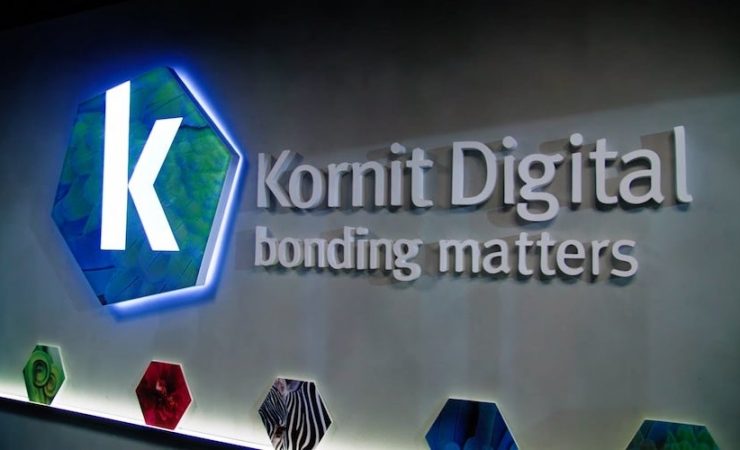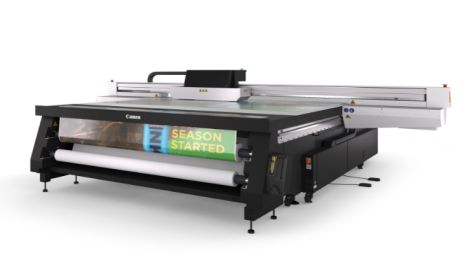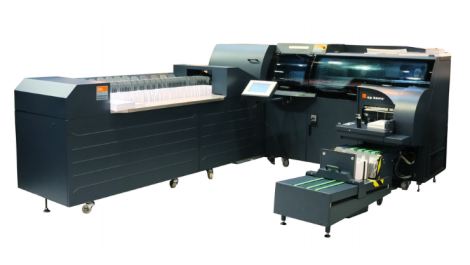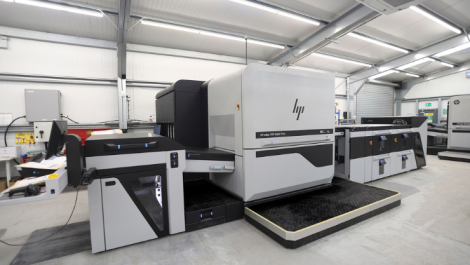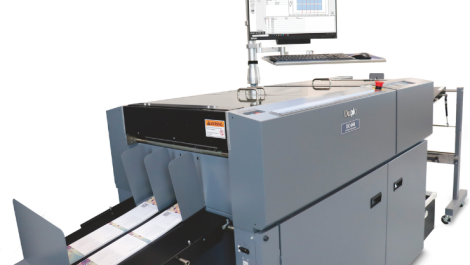We might have spent most of 2020 trapped in our own homes, but that doesn’t mean it hasn’t been a busy year. Major events and exhibitions have been cancelled or postponed but new machines have still been launched, new deals signed and innovations announced. Charlie Kortens explores the biggest news from the past 12 months
DGI launched a new entry level 1.9m wide-format dye sublimation printer. Unveiled in June, the Hercules builds on the reputation of its industrial siblings, the FT-1608, Poseidon and HSFT III, offering customers ‘an entry level printer with class leading performance.’
The Hercules features twin staggered printheads, offers users a maximum print speed of 98sqm/hr and prints at a resolution up to 720 x 1200dpi. The latest Ergosoft V16 DGI edition Rip software comes as standard.
Right at the beginning of the year, Durst restructured its Industrial Textile Printing Segment, appointing Stefan Kappaun as segment manager in place of Martin Winkler, who will take on the role of global sales manager, textile printing.
Since January Mr Kappaun has had strategic responsibility for the direction the company takes in home textiles, clothing and accessories. He will also be the connecting link to the Large Format Segment, which is responsible for soft signage and fabrics.
EFI introduced a pair of very high throughput soft signage printers, the 3.4m EFI Colors and EFI Power models, that build on the expertise of its Reggiani division to offer high volume production at up to 1564sqm/hr.
Sitting above the established FabriVu 240 and 340i models in terms of productivity, the Colors 340 can handle fabrics up to 450gsm and is said to be suitable for producing a range of high quality items from tablecloths and pop-up commercial tents to backlit displays, flags and retail fixtures at up to 800sqm/hr in ‘production’ quality; ‘PoP’ and ‘high quality’ modes reduce this to 428 and 218sqm/hr respectively.
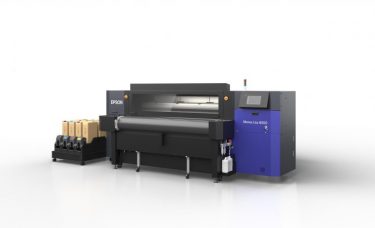
Epson’s ML-8000 is set to be available in the UK from January 2021
One company that has been particularly busy this year is Epson. In July it launched the SureColor SC-F10000, a 1.9m industrial dye sublimation printer.
Potential applications of the printer, which operates at speeds of up to 255sqm/hr and makes use of Epson’s Precision Dot technology, include fashion, sportswear, home furnishings, promotional goods and soft signage.
A month later company confirmed that two of its subsidiaries, Robustelli and For.Tex, were merging as part of a drive to take advantage of predicted growth in the textiles segment. Both companies are based in Como, Italy, one of the world’ major centres for textile printing. At the time Epson said the merger would allow it to provide better need-based solutions for inkjet digital printers, consumables, and services.
Then, in September, Epson announced the launch of the ML-8000, the latest model in its Monna Lisa series of high-end digital textile printers. Scheduled to be available in the UK from January 2021, the ML-8000 has eight PrecisionCore printheads, prints at a resolution of up to 1200dpi and across a width of up to 180cm. The system operates at a typical print speed of 155sqm/hr but is capable of a maximum speed of 250 sqm/hr.
Finally, in October, Epson unveiled its first A4 dye sublimation printer, the SureColor SC-F100. The company says the printer, which also uses the ubiquitous PrecisionCore MicroTFP printheads, is aimed at small businesses and start-ups looking to expand their product offering into the promotional goods sector.
Rivalling Epson in the ‘busiest year’ stakes, Kornit kicked off 2020 by introducing a ‘dry digital softening process’ that aims to restore the hand feel of a wide range of textile types after digital printing, opening up wider opportunities for users of its printers, and reducing the environmental impact of fashion and other garment production.
The NeoPigment Robusto Softener is an addition to the eponymous ink range launched by Kornit at Itma in summer 2019. Its application requires the use of one channel in each printhead, and it is applied last, after the ‘fix on the fly’ fixation process.
In August the Israeli company expanded its software portfolio with the acquisition of Macclesfield-based Custom Gateway, a developer of Cloud-based workflow software for on-demand production.
Custom Gateway’s cloud-based platform is said to suit both B2B and B2C models and to cover all steps in on-demand production. This includes content sourcing or creation, management and display at the front end, complemented by a ‘robust’ order management system and automated routing to production sites, with production tracking and integration with existing IT and workflow/business intelligence software.
The company also established a UK entity devoted exclusively to serving the British market, the largest in the Emea region. The British textile industry remains the fifth largest in the world, worth more than £9 billion per year. The move allowed Kornit to bill in Sterling and will be offering a British distribution hub for inks and consumables
Finally, in a story that escaped the print industry and was found in ‘normal’ news, Amazon committed to spending $400 million, spread over the next five years, on Kornit’s digital technology and services. The spend comes as part of a public offering of shares by Kornit and will see $250 million invested in its existing products, including printers and inks, with the remaining $150 million earmarked for future products.
At the very beginning of the year Mimaki unveiled its new digital textile printer, the Tx300P-1800 MkII. Suitable for both direct-to-textile and transfer printing, with interchangeable platens and three different ink combinations, the printer was initially intended to be centrepiece of Mimaki’s Fespa display.
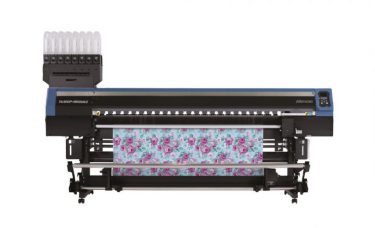
Mimaki originally intended the Tx300P-1800 MkII to be its centrepiece at Fespa
The original version of the printer, the Tx300P-1800, was released in 2017 and stood out for its ability to handle two different ink sets. With the MkII Mimaki has added dye sublimation transfer capabilities as well. This versatility means the printer can fulfil a wide range of textile applications from fashion to interior decor to wallpapers, all within one system.
Ricoh introduced the Ri 2000 direct-to-garment printer, which offers 1200 x 1200dpi printing on a range of textile products, from T-shirts and tote bags to face masks and safety vests.
Claimed to set ‘a new benchmark in terms of productivity and efficiency in its class’, the new printer is said to enable colour consistency, automation of production workflows and creation of white layers for printing on dark garments via ColorGate Rip technology.
Roland DG started shipping the Texart XT 640S DtG printer, previewed at Fespa 2019, which is designed for rapid printing of T-shirts via a jig that allows 12 garments to be printed at once, each with a different design.
The XT-640S combines the head carriage and mechanics of the existing Textart 640 line with a multiple platen jig that when fully loaded allows each shirt in a batch of 12 to effectively be printed in eight seconds, with a maximum image area of 200 x 260mm, printing in ‘production mode’ with CMYK only.
It also unveiled its new EJ-640 Deco printer which uses ecological water-based ink to digitally print interior décor applications. The EJ-640 Deco can produce customised wallpaper, lampshades, blinds, posters, exhibition graphics and outdoor promotions. It is intended to meet the ever-growing consumer appetite for eco-friendly products and designs that stand out from the crowd.
Right at the close of the year Polyprint formed a new American subsidiary specifically to help it meet the growing demand for its TexJet printers in the world’s largest DtG market.
Based in Charlotte, North Carolina, the new branch opened its doors on 9 December and will be headed by Luke Ryerkerk. Despite establishing its own presence, Polyprint will continue its partnership with Ryonet, an established US textile print solution provider which supplies TexJet printers throughout the USA.
